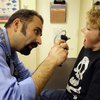0
Report
Community:
Feb 17, 2023
The findings from a Syracuse University study linking universal school meal policies with improved school attendance for young students provides a strong case for expanding free school meals, according to school nutrition and attendance experts.
Authored by: Anna Merod for K-12 DIVE
Topics: Attendance, Early childhood, Education, Food insecurity, Health, Legislation & Policy, Low-income, Nutrition, Youth
 Shared by Sandra Ware
Shared by Sandra Ware
Sandra Ware posted a
on Feb 23, 2023
The findings from a Syracuse University study linking universal school meal policies with improved school attendance for young students provides a strong case for expanding free school meals, according to school nutrition and attendance experts.
0
Report
Community:
Feb 7, 2023

In the 2020-21 school year, more than 25 million children and youth – roughly half of all elementary and secondary students in the United States – attended schools in school districts that lacked dedicated funding to identify and support students experiencing homelessness. This significant funding gap increases the likelihood that many children and youth experiencing homelessness will not be identified, and even in cases where they are identified, that they will not receive the educational protections and services that can stabilize their education and their lives. Ensuring access to these supports is an important part of creating a school system that meets the needs of all our nation’s children and youth. SchoolHouse Connection and Poverty Solutions at the University of Michigan analyzed publicly-available preK-12 federal education data for the 2020-2021 school year to examine patterns that are correlated with under-identifying and inadequately supporting children and youth experiencing homelessness.
Authored by: SchoolHouse Connection and University of Michigan
Topics: Early childhood, Education, Funding, Homelessness, Low-income, Research, School-readiness, Stability, Youth
 Shared by Sandra Ware
Shared by Sandra Ware
Sandra Ware posted a
on Feb 21, 2023
SchoolHouse Connection and University of Michigan
In the 2020-21 school year, more than 25 million children and youth – roughly half of all elementary and secondary students in the United States – attended schools in school districts that lacked dedicated funding to identify and support students experiencing homelessness.
0
Report
Community:
Apr 11, 2022
Educators play an important role in supporting students' mental well-being. The pandemic has added incredible layers of stress for both adults and young people. Although educators can't control all the stressors and sources of trauma affecting them, they can foster healing and wellness in their classroom or program and work to remove the stigma around mental health concerns.
Authored by: First Book Research & Insights
Topics: Advocacy, Depression, Early childhood, Education, Health, Healthy homes, Literacy, Low-income, Mental health, Racial inequalities, Research, School-readiness, Youth
 Shared by Stephanie Gray
Shared by Stephanie Gray
Stephanie Gray posted a
on Apr 11, 2022
First Book Research & Insights
Educators play an important role in supporting students' mental well-being. The pandemic has added incredible layers of stress for both adults and young people.
0
Publication
Community:
Jun 17, 2021
Authored by: U.S. Department of Housing and Urban Development Choice Neighborhoods
Topics: Attendance, COVID-19, Early childhood, Education, Family engagement, Housing, Low-income, Out-of-school time, Youth
 Shared by Kirsten Greenwell
Shared by Kirsten Greenwell
Kirsten Greenwell posted a
on Jun 17, 2021
U.S. Department of Housing and Urban Development Choice Neighborhoods
0
Report
Community: Youth
Dec 1, 2020
420,000.
Based on the new report, "Lost in the Masked Shuffle & Virtual Void: Children and Youth Experiencing Homelessness Amidst the Pandemic" from SchoolHouse Connection and Poverty Solutions at the University of Michigan, that’s how many fewer children and youth experiencing homelessness have been identified and enrolled by schools so far this school year.
According to our data and insights - gathered from educators and homeless liaisons across 49 states - the number of children, youth, and families experiencing homelessness has likely increased due to the economic crisis. Yet, because of COVID-19 challenges in identifying children and youth experiencing homelessness, hundreds of thousands may not be getting the education and support they need - from internet access, to housing, to food, to child care.
What’s more, only 18% of respondents indicated that federal coronavirus relief education funding provided by the CARES Act is being used to meet the needs of students experiencing homelessness.
To break generational cycles of homelessness, we must take swift action to support the increasing number of children, youth, and families in need. Check out our report to learn more and take action. We have included recommendations for Congressional leaders, state and local educational agencies, homeless, housing, food, and other relief agencies, and philanthropic organizations.
Authored by: Poverty Solutions at THE UNIVERSITY OF MICHIGAN & SCHOOLHOUSE CONNECTION
Topics: Attendance, Child welfare, Early childhood, Education, Funding, Health, Homelessness, Low-income, Stability, Youth
 Shared by Housing Is
Shared by Housing Is
Housing Is posted a
on Dec 1, 2020
Poverty Solutions at THE UNIVERSITY OF MICHIGAN & SCHOOLHOUSE CONNECTION
0
Policy Brief
Community:
Dec 4, 2019

In California, more than 3.7 million students were eligible for free or reduced priced school meals in the 2017-2018 school year. For many of those students, school meals are the primary source of regular access to healthy food. When the bell rings at 3:00 or lets out for summer break, many of those students go home to nutritional uncertainty or high-calorie, low-nutrient foods.
For many low-income families, the out-of-school-time food access gap increases family stress: limited budgets are stretched further to cover food, rent, utilities, transportation, medications, and chidcare costs. For very young children, food insecurity can negatively impact brain and physical development. For children of all ages, disrupted access to healthy food can impact behavior, increase risk of obesity, make it harder to concentrate, or exacerbate existing healthy conditions like type 2 diabetes. The impact is not limited to summer, and can lead to a rocky start to the school year, negatively impacting school attendance and students’ ability to effectively participate in school.
Read the full brief to learn how public and affordable housing communities can address food insecurity for children and youth with the help of out-of-school-time USDA child nutrition programs.
Authored by:
Topics: Advocacy, Early childhood, Food insecurity, Health, Healthy homes, Housing, Legislation & Policy, Low-income, Nutrition, Out-of-school time, West Coast, Youth
 Shared by Linda Lu
Shared by Linda Lu
Linda Lu posted a
on Dec 4, 2019
In California, more than 3.7 million students were eligible for free or reduced priced school meals in the 2017-2018 school year. For many of those students, school meals are the primary source of regular access to healthy food.
0
News Article
Community:
Recognizing that the aging of its population will reshape housing needs, the city of Washington, DC, has fostered numerous options for older residents, including some that are intentionally multigenerational.
Authored by: PD&R Edge Online Magazine
Topics: Early childhood, Family engagement, Housing, Low-income, Seniors, Youth
 Shared by Housing Is
Shared by Housing Is
Housing Is posted a
on Jun 11, 2019
PD&R Edge Online Magazine
Recognizing that the aging of its population will reshape housing needs, the city of Washington, DC, has fostered numerous options for older residents, including some that are intentionally multigenerational.
0
Video
Community:
May 9, 2019
On May 9, the Brookings Institution hosted an event to discuss the subsequent report, “A Roadmap to Reducing Child Poverty.” The event featured comments from Greg Duncan, who served as Chair of the Committee on Building an Agenda to Reduce the Number of Children in Poverty by Half in 10 Years, as well as a panel discussion on the report, its recommendations, and barriers to implementation. A second panel highlighted national and state policy perspectives of the consensus study report.
Authored by: The Brookings Institution
Topics: Early childhood, Funding, Housing, Legislation & Policy, Low-income, Research, Youth
 Shared by Housing Is
Shared by Housing Is
Housing Is posted a
on May 13, 2019
The Brookings Institution
On May 9, the Brookings Institution hosted an event to discuss the subsequent report, “A Roadmap to Reducing Child Poverty.” The event featured comments from Greg Duncan, who served as Chair of the Committee on Building an Agenda to Reduce the Number of Children in Poverty by Half in 10 Years, as we
0
Research
Community:
Mar 8, 2019
The number of kids enrolled in Medicaid and the Children’s Health Insurance Program (CHIP) — two government health plans for the poor — fell by nearly 600,000 in the first 11 months of 2018, a precipitous drop that has puzzled and alarmed many health policy analysts, while several states say it reflects the good news of an improving economy.
Authored by: Michael Ollove for The Pew Charitable Trusts
Topics: Affordable Care Act, Child welfare, Early childhood, Health, Legislation & Policy, Low-income, Medicaid / Medicare, Research, Youth
 Shared by Housing Is
Shared by Housing Is
Housing Is posted a
on Mar 8, 2019
Michael Ollove for The Pew Charitable Trusts
The number of kids enrolled in Medicaid and the Children’s Health Insurance Program (CHIP) — two government health plans for the poor — fell by nearly 600,000 in the first 11 months of 2018, a precipitous drop that has puzzled and alarmed many health policy analysts, while several states say it refl
0
Publication
Community:
Jan 24, 2019
Affordable housing campaigns are not new, of course, but what is unprecedented and transformative about Opportunity Starts at Home is the scope and diversity of the partners that are joining forces to advocate for more robust and equitable federal housing policies. The campaign is advised by a Steering Committee including leading national organizations representing a wide range of interests that are working shoulder-to-shoulder to solve the affordable housing crisis.
Authored by: Opportunity Starts at Home
Topics: Asset building, Child welfare, CLPHA, Community development, Early childhood, Education, Food insecurity, Funding, Health, Homelessness, Housing, Immigrants, Legislation & Policy, Low-income, Mobility, Out-of-school time, Partnerships, Racial inequalities, Safety, Seniors, Stability, Substance abuse, Youth
 Shared by Mica O'Brien
Shared by Mica O'Brien
Mica O'Brien posted a
on Jan 24, 2019
Opportunity Starts at Home
Affordable housing campaigns are not new, of course, but what is unprecedented and transformative about Opportunity Starts at Home is the scope and diversity of the partners that are joining forces to advocate for more robust and equitable federal housing policies.
0
Report
Community:
Oct 24, 2018
CLPHA’s Housing Is Initiative is engaged in a number of cross-sector activities focused on developing partnerships, facilitating a community of practice, resource development, promoting best practices, online collaboration, policy and advocacy, and training and education. Read about recent activities in this Fall Update.
Authored by:
Topics: Child welfare, CLPHA, Community development, Cost effectiveness, Data sharing, Early childhood, Education, Family engagement, Funding, Health, Homelessness, Housing, Low-income, Medicaid / Medicare, Mental health, Partnerships, Place-based, Post-secondary, Research, Stability, Substance abuse, Workforce development, Youth
 Shared by Mica O'Brien
Shared by Mica O'Brien
Mica O'Brien posted a
on Oct 24, 2018
CLPHA’s Housing Is Initiative is engaged in a number of cross-sector activities focused on developing partnerships, facilitating a community of practice, resource development, promoting best practices, online collaboration, policy and advocacy, and training and education.
0
Interactive
Community:
Which neighborhoods in America offer children the best chance to rise out of poverty? The Opportunity Atlas answers this question using anonymous data following 20 million Americans from childhood to their mid-30s. Now you can trace the roots of today's affluence and poverty back to the neighborhoods where people grew up. See where and for whom opportunity has been missing, and develop local solutions to help more children rise out of poverty.
Authored by: Census Bureau, Harvard University, and Brown University
Topics: Asset building, Child welfare, Dual-generation, Early childhood, Education, Health, Housing, Low-income, Mobility, Stability, Youth
 Shared by Housing Is
Shared by Housing Is
Housing Is posted a
on Oct 12, 2018
Census Bureau, Harvard University, and Brown University
Which neighborhoods in America offer children the best chance to rise out of poverty? The Opportunity Atlas answers this question using anonymous data following 20 million Americans from childhood to their mid-30s.
0
Research
Community:
May 1, 2018
The third in a series of Research-to-Impact briefs by Chapin Hall at the University of Chicago on understanding and addressing youth homelessness.
Authored by: Chapin Hall and Voices of Youth Count
Topics: Early childhood, Family engagement, Home visiting, Low-income, Partnerships, Pre-natal, Research, Youth
 Shared by Mica O'Brien
Shared by Mica O'Brien
Mica O'Brien posted a
on Oct 10, 2018
Chapin Hall and Voices of Youth Count
The third in a series of Research-to-Impact briefs by Chapin Hall at the University of Chicago on understanding and addressing youth homelessness.
0
Policy Brief
Community:
This short document provides basic information to help housing and homeless assistance providers advocate with their families and youth for appropriate educational services, from birth through higher education. The rights and protections outlined here apply to all children and youth experiencing homelessness, as defined by the education subtitle of the McKinney-Vento Act.
Authored by: SchoolHouse Connection
Topics: Disabilities, Dual-generation, Early childhood, Education, Family engagement, Homelessness, Housing, Legislation & Policy, Low-income, Post-secondary, Youth
 Shared by Mica O'Brien
Shared by Mica O'Brien
Mica O'Brien posted a
on Oct 10, 2018
This short document provides basic information to help housing and homeless assistance providers advocate with their families and youth for appropriate educational services, from birth through higher education.
0
Research
Community:
Aug 1, 2018
Homelessness among children is correlated with developmental delays, fair or poor health, and high healthcare utilization. Associations of homelessness specifically among infants younger than 12 months, however, are unknown. This study evaluates homelessness during infancy as a risk for adverse infant and maternal health and hardship.
Authored by:
Topics: Child welfare, Depression, Disabilities, Dual-generation, Early childhood, Education, Family engagement, Food insecurity, Grade-level proficiency, Health, Homelessness, Housing, Low-income, Metrics, Partnerships, Pre-natal, Research, School-readiness, Youth
 Shared by Housing Is
Shared by Housing Is
Housing Is posted a
on Aug 1, 2018
Homelessness among children is correlated with developmental delays, fair or poor health, and high healthcare utilization. Associations of homelessness specifically among infants younger than 12 months, however, are unknown.
0
Report
Community:
Jul 11, 2018
To help inform policymakers and move policy forward, this paper discusses the current state of housing in the United States, provides a conceptual framework for housing as a platform to improve educational outcomes for children, reviews the existing evidence that supports conceptual models, and identifies the major gaps in research. Finally, it proposes a list of projects that make up a research agenda for understanding the issue and guiding investments in new research.
Authored by:
Topics: Attendance, Child welfare, Early childhood, Education, Housing, Literacy, Low-income, Mental health, Post-secondary, Preventative care, Racial inequalities, Research, Safety, Stability, Youth
 Shared by Housing Is
Shared by Housing Is
Housing Is posted a
on Jul 11, 2018
To help inform policymakers and move policy forward, this paper discusses the current state of housing in the United States, provides a conceptual framework for housing as a platform to improve educational outcomes for children, reviews the existing evidence that supports conceptual models, and iden
0
News Article
Community:
May 25, 2018
Community organizations are improving health equity by tackling the cycle of poverty in urban neighborhoods.
Authored by: Jacqui Cook
Topics: Asthma, Child welfare, Community development, Early childhood, Exercise, Family engagement, Health, Low-income, Medicaid / Medicare, Midwest, Nutrition, Obesity, Out-of-school time, Partnerships, Preventative care, Racial inequalities, Research, Safety, Youth
 Shared by Housing Is
Shared by Housing Is
Housing Is posted a
on Jul 11, 2018
Community organizations are improving health equity by tackling the cycle of poverty in urban neighborhoods.
0
Policy Brief
Community:
Jul 10, 2018
Children’s HealthWatch's brief "asks two straightforward questions: If health starts at home, what are the healthcare and educational costs of unstable housing? Which policy solutions could create stable homes for healthier families?"
Authored by: Children's Health Watch
Topics: Asthma, Child welfare, Dental, Early childhood, Education, Foster care, Grade-level proficiency, Health, Healthy homes, Housing, Lead, Literacy, Low-income, Medicaid / Medicare, Obesity, Partnerships, Pre-natal, Preventative care, Racial inequalities, School-readiness, Stability, Vision, Youth
 Shared by Steve Lucas
Shared by Steve Lucas
Steve Lucas posted a
on Jul 10, 2018
Children’s HealthWatch's brief "asks two straightforward questions: If health starts at home, what are the healthcare and educational costs of unstable housing? Which policy solutions could create stable homes for healthier families?"
0
Report
Community:
Mar 6, 2018
MDRC, a nonprofit, nonpartisan education and social policy research firm, released encouraging results from a demonstration, funded by Robin Hood, of two aligned interventions in New York City.
Authored by: MDRC
Topics: Early childhood, Education, Grade-level proficiency, Low-income, Metrics, Racial inequalities, Research, Youth
 Shared by Housing Is
Shared by Housing Is
Housing Is posted a
on Jul 5, 2018
MDRC, a nonprofit, nonpartisan education and social policy research firm, released encouraging results from a demonstration, funded by Robin Hood, of two aligned interventions in New York City.
0
News Article
Community:
Jul 2, 2018
Poor children don't struggle in school because of their parents. They struggle because of poverty.
Authored by: Mical Raz for The Washington Post
Topics: Attendance, Child welfare, Dual-generation, Early childhood, Education, Family engagement, Food insecurity, Grade-level proficiency, Housing, Legislation & Policy, Literacy, Low-income, Out-of-school time, Post-secondary, Racial inequalities, Research, School-readiness, Youth
 Shared by Mica O'Brien
Shared by Mica O'Brien
Mica O'Brien posted a
on Jul 3, 2018
Mical Raz for The Washington Post
Poor children don't struggle in school because of their parents. They struggle because of poverty.
1
Video
Community:
May 23, 2018
The Council of Large Public Housing Authorities (CLPHA) hosted The Housing Is Summit in Washington, D.C., on May 3-4, 2018 with 300 partners across the housing, education, and healthcare sectors. Access video recordings of the Summit's keynote speakers (HUD Secretary Ben Carson, John Bridgeland, Matthew Morton), plenary panels (on topics that cut across sectors like anchor institutions, data collaboration, stability, and foundation investments), and select breakout sessions focused on the intersections of housing, education, and health.
Authored by: Council of Large Public Housing Authorities
Topics: Affordable Care Act, Attendance, Child welfare, CLPHA, Community development, Data sharing, Dual-eligibles, Dual-generation, Early childhood, Education, Funding, Grade-level proficiency, Health, Healthy homes, Homelessness, Housing, Legislation & Policy, Low-income, Medicaid / Medicare, Mental health, Metrics, MTW, Out-of-school time, Partnerships, Place-based, Preventative care, Racial inequalities, Research, School-readiness, Seniors, Stability, Substance abuse, Supportive housing, Sustainability, TA, Workforce development, Youth
 Shared by Steve Lucas
Shared by Steve Lucas
Steve Lucas posted a
on May 23, 2018
The Council of Large Public Housing Authorities (CLPHA) hosted The Housing Is Summit in Washington, D.C., on May 3-4, 2018 with 200 partners across the housing, education, and healthcare sectors. The Summit highlighted the ways that we can transform systems to better serve low-income people with two days of plenary speakers/panels, breakout sessions, and caucus discussions geared toward intersectional thinking and ways to take action.
Council of Large Public Housing Authorities
The Council of Large Public Housing Authorities (CLPHA) hosted The Housing Is Summit in Washington, D.C., on May 3-4, 2018 with 300 partners across the housing, education, and healthcare sectors.


 Shared by Sandra Ware
on Feb 23, 2023
Shared by Sandra Ware
on Feb 23, 2023


 Shared by Sandra Ware
on Feb 21, 2023
Shared by Sandra Ware
on Feb 21, 2023

 Shared by Stephanie Gray
on Apr 11, 2022
Shared by Stephanie Gray
on Apr 11, 2022
 Shared by Kirsten Greenwell
on Jun 17, 2021
Shared by Kirsten Greenwell
on Jun 17, 2021
 Shared by Housing Is
on Dec 1, 2020
Shared by Housing Is
on Dec 1, 2020

 Shared by Linda Lu
on Dec 4, 2019
Shared by Linda Lu
on Dec 4, 2019


 Shared by Housing Is
on Jun 11, 2019
Shared by Housing Is
on Jun 11, 2019

 Shared by Housing Is
on May 13, 2019
Shared by Housing Is
on May 13, 2019

 Shared by Housing Is
on Mar 8, 2019
Shared by Housing Is
on Mar 8, 2019

 Shared by Housing Is
on Oct 12, 2018
Shared by Housing Is
on Oct 12, 2018
 Shared by Housing Is
on Aug 1, 2018
Shared by Housing Is
on Aug 1, 2018
 Shared by Housing Is
on Jul 11, 2018
Shared by Housing Is
on Jul 11, 2018
 Shared by Housing Is
on Jul 11, 2018
Shared by Housing Is
on Jul 11, 2018
 Shared by Steve Lucas
on Jul 10, 2018
Shared by Steve Lucas
on Jul 10, 2018
 Shared by Housing Is
on Jul 5, 2018
Shared by Housing Is
on Jul 5, 2018


 Shared by Steve Lucas
on May 23, 2018
Shared by Steve Lucas
on May 23, 2018